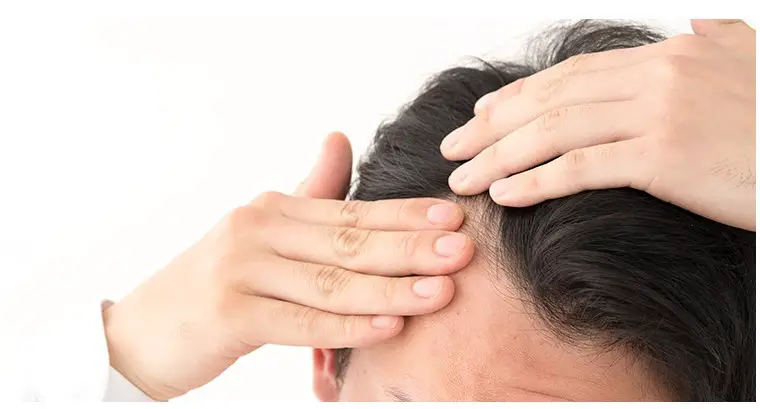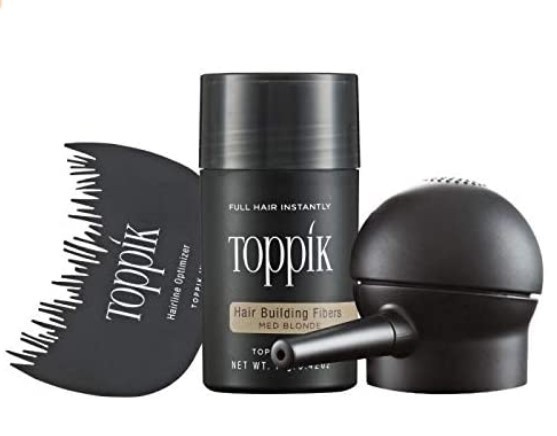Learning how to make rosemary oil for hair can be a game-changer for your hair care routine. This natural elixir, known for its stimulating properties, can help improve hair growth, reduce hair loss, and enhance the overall health of your hair.
Are you looking for a natural solution to promote hair growth and enhance the health of your hair? If so, rosemary oil might be the perfect remedy for you. This blog post will guide you through the process of making your own rosemary oil for hair at home. Not only is this a cost-effective solution, but it also allows you to reap the benefits of this natural elixir in its purest form.
Rosemary oil has been used for centuries for its numerous health benefits, particularly for hair care. It is known to stimulate hair growth, address scalp issues, and enhance the shine and texture of hair. Whether you’re dealing with hair loss, dandruff, or dull hair, rosemary oil can be a game-changer for your hair care routine.
In this comprehensive guide, we will delve into the benefits of rosemary oil for hair, provide step-by-step instructions on how to make rosemary oil at home using different methods, and discuss how to use it effectively for hair growth. We will also answer some frequently asked questions about rosemary oil for hair.
Key Takeaways
- Rosemary oil is a potent natural remedy that can help stimulate hair growth, improve scalp health, and enhance the overall appearance of your hair. It’s rich in antioxidants and anti-inflammatory compounds that can promote a healthy scalp environment conducive to hair growth.
- There are several ways to make rosemary oil at home, including the rosemary-infused carrier oil method, the quick rosemary oil method, and the rosemary essential oil and carrier oil method. Each method has its own benefits and drawbacks, so it’s important to choose the one that best suits your needs and preferences.
- When using rosemary oil for hair growth, consistency is key. It’s recommended to apply the oil to your scalp and hair at least once or twice a week for the best results. However, always do a patch test first to ensure you’re not allergic to the oil.
- Rosemary oil can be mixed with other beneficial oils like castor oil, argan oil, and jojoba oil to enhance its hair growth benefits. You can also add essential oils like lavender for additional therapeutic effects.
- It’s important to remember that while rosemary oil can help stimulate hair growth, it’s not a magic cure for hair loss. Factors like diet, stress levels, and underlying health conditions can also affect hair growth, so it’s important to address these factors as well.
- Lastly, always consult with a healthcare professional or a certified aromatherapist before starting any new hair care regimen involving essential oils, especially if you have any pre-existing health conditions or are pregnant or breastfeeding.
So, if you’re ready to transform your hair care routine and promote healthier, more vibrant hair, keep reading. You might also be interested in exploring other natural remedies for hair growth, such as castor oil and essential oils. Let’s embark on this journey to healthier hair together!
Understanding the Benefits of Rosemary Oil for Hair
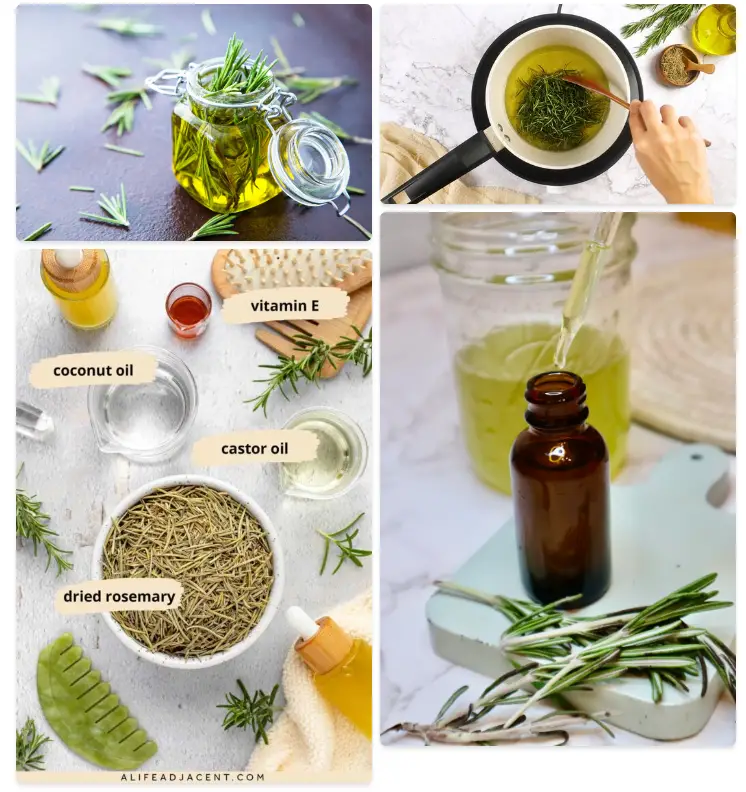
Rosemary oil is a potent natural remedy that has been used for centuries for its numerous health benefits. When it comes to hair care, rosemary oil is a powerhouse ingredient that can transform your hair from dull and lifeless to vibrant and healthy. Let’s delve into the benefits of rosemary oil for hair.
Stimulates Hair Growth
One of the most notable benefits of rosemary oil is its ability to stimulate hair growth. It works by improving blood circulation in the scalp, which ensures that the hair follicles are well-nourished and receive essential nutrients and oxygen. This not only promotes healthy hair growth but also helps to reduce hair loss. If you’re dealing with hair thinning or hair loss, incorporating rosemary oil into your hair care routine can make a significant difference. You might also want to explore other natural remedies for hair growth, such as castor oil.
Strengthens Hair Follicles
Rosemary oil is known to strengthen hair follicles, making them more resistant to breakage. This means that your hair will be less prone to damage and breakage, which is crucial for maintaining healthy, long hair. If you’ve been struggling with hair breakage, consider giving rosemary oil a try.
Addresses Scalp Issues
Rosemary oil is also effective in addressing various scalp issues, including dandruff and dry, itchy scalp. It has antimicrobial and anti-inflammatory properties that help combat dandruff and soothe an itchy scalp. Moreover, rosemary oil helps regulate oil production in the scalp, preventing excess oiliness that can lead to dandruff and other scalp issues.
Enhances Hair Shine and Texture
Using rosemary oil can significantly enhance the shine and lustre of your hair. It works by smoothing the hair cuticles, which reduces frizz and improves hair texture. Moreover, rosemary oil acts as a natural conditioner, moisturising the hair strands and combating dryness. If you’ve been dealing with dull, lifeless hair, rosemary oil might be the solution you need.
Incorporating rosemary oil into your hair care routine can contribute to healthier, more vibrant hair. However, it’s important to remember to perform a patch test before using rosemary oil, especially if you have sensitive skin or scalp. If you have specific concerns or conditions, it’s always a good idea to consult with a professional.
In the next section, we will guide you through the process of making your own rosemary oil at home. Whether you prefer using rosemary essential oil, fresh rosemary, or dried rosemary, we’ve got you covered. So, let’s get started on this journey to healthier hair with rosemary oil! If you’re interested in exploring other natural remedies for hair growth, check out our guide on essential oils for hair growth.
How to Make Rosemary Oil for Hair at Home
Making your own rosemary oil for hair at home is a simple and cost-effective way to enjoy the benefits of this powerful herb. Not only does it allow you to control the quality of the ingredients, but it also gives you the flexibility to customize the oil to suit your specific hair needs.
In this section, we will explore various methods to make rosemary oil for hair at home. While you can purchase high-quality rosemary oil from reputable brands like Weleda’s Rosemary Hair Oil or Nature Spell’s Rosemary Oil for Hair, making your own rosemary oil gives you control over the ingredients and allows you to customize the oil to suit your specific hair needs.
One popular method involves infusing rosemary in olive oil. This method is simple and requires only a few ingredients: fresh or dried rosemary and olive oil. The resulting rosemary-infused olive oil is a versatile hair treatment that can be used on its own or mixed with other beneficial oils.
For those who prefer a quicker method, you can make a rosemary oil spray for hair. This is a convenient option for those who want to regularly apply rosemary oil to their hair without the mess.
Lastly, for the DIY enthusiasts, creating your own rosemary oil for hair growth can be a rewarding project. This method involves a bit more time and effort but the result is a potent hair growth oil that you can proudly say you made yourself.
Here are some method below you can try instantly to make rosemary oil for hair hair growth:
Method 1: Rosemary-Infused Carrier Oil
This method involves infusing dried rosemary leaves with a carrier oil and an antioxidant. The result is a potent, fragrant, and vibrant golden oil packed with rosemary’s beneficial compounds. Here’s how to make rosemary-infused carrier oil:
- Place dried rosemary leaves in a small stainless steel saucepan or miniature double boiler.
- Pour castor oil and fractionated coconut oil (or another carrier oil) over the herbs to cover them.
- Add vitamin E oil to the mixture. Stir to incorporate and ensure the herbs are completely submerged in oil.
- Heat the mixture on low heat for 2-3 hours, stirring occasionally.
- Remove from heat and let the mixture cool.
- Strain the oil through a fine-mesh strainer or cheesecloth into a clean jar or bottle.
This oil can be used as a hair treatment to stimulate hair growth, strengthen hair follicles, and enhance hair shine and texture. If you’re interested in other oils that promote hair growth, check out our comparison of Jamaican black castor oil vs. castor oil for hair growth.
Method 2: Quick Rosemary Oil
This method involves heating fresh rosemary sprigs in your oil of choice. However, this oil must be used within a week, or it could go rancid. Here’s how to make quick rosemary oil:
- Wash a few sprigs of rosemary under cold water.
- Remove the leaves from the stem and measure out 1 cup of leaves.
- Pour oil over the rosemary in a jar, leaving about half an inch of space at the top. Ensure all the rosemary is completely submerged in the oil.
- Place the jar in a sunny place to slowly infuse into an edible oil.
Method 3: Rosemary Essential Oil and Carrier Oil
This method involves diluting rosemary essential oil with a carrier oil. Here’s how to make rosemary essential oil and carrier oil:
- Add 5 drops of rosemary essential oil to the carrier oil of your choice, such as argan, coconut, or jojoba.
- Mix well and massage the mixture into your scalp.
Method 4: Rosemary and Lavender Hair Oil
This method involves blending rosemary and lavender essential oils with a carrier oil. Here’s how to make rosemary and lavender hair oil:
- Mix 1 cup of a carrier oil (like olive oil, jojoba oil, or coconut oil) with 5 drops of rosemary essential oil and 5 drops of lavender essential oil.
- Massage the mixture into your scalp and hair.
Remember, rosemary oil can cause an allergic reaction in some people, so it’s best to do a patch test before using it on your hair. If you’re interested in exploring other natural remedies for hair growth, check out our guide on essential oils for hair growth.
In the next section, we’ll discuss how often you should use rosemary oil on your hair and what other essential oils can be mixed with rosemary oil for hair growth. Stay tuned!
How to Use Rosemary Oil for Hair Growth
Once you’ve made your own rosemary oil for hair growth, the next step is to understand how to use it effectively. Applying rosemary oil to your hair and scalp can stimulate hair follicles, improve hair thickness, and promote hair growth. Here’s how to incorporate rosemary oil into your hair care routine:
Step 1: Perform a Patch Test
Before applying rosemary oil to your scalp, it’s crucial to perform a patch test to ensure you’re not allergic to it. Apply a small amount of the oil to your inner forearm and wait for 24 hours. If you experience any redness, itching, or discomfort, you should avoid using the oil on your scalp.
Step 2: Apply the Oil to Your Scalp
Massage the rosemary oil into your scalp. You can use your fingers or a scalp massager to ensure the oil is evenly distributed. The massage can help stimulate blood circulation to the scalp, promoting hair growth.
Step 3: Leave the Oil On
Allow the oil to sit on your scalp for at least 30 minutes. For a more intensive treatment, you can leave it on overnight. Just be sure to cover your hair with a shower cap to avoid staining your pillow.
Step 4: Rinse Out the Oil
After the oil has had time to absorb, rinse it out with warm water. Then, shampoo and condition your hair as usual.
Step 5: Repeat Regularly
For best results, repeat this process 1-2 times per week. Consistency is key when it comes to seeing results from rosemary oil.
Remember, everyone’s hair is different, so what works for one person might not work for another. It’s important to listen to your hair and adjust your routine as needed. If you’re interested in other natural hair growth remedies, check out our Elevate Hair Growth Oil Review.
In the next section, we’ll answer some frequently asked questions about using rosemary oil for hair growth. Stay tuned!
Mixing Rosemary Oil with Other Essential Oils for Enhanced Hair Growth
In this section, we will discuss how to enhance the benefits of rosemary oil by mixing it with other essential oils. For instance, you can mix rosemary oil with castor oil, a popular hair growth oil, to create a powerful hair growth treatment.
You can also visit Neal’s Yard Remedies for their Organic and Natural Vegan Essential Oil 10ml, which can be a great addition to your rosemary oil hair treatment.
Rosemary oil is a powerful tool in promoting hair growth on its own, but when combined with other essential oils, its potency can be significantly enhanced. Here are a few essential oils you can mix with rosemary oil for even better results:
1. Lavender Oil
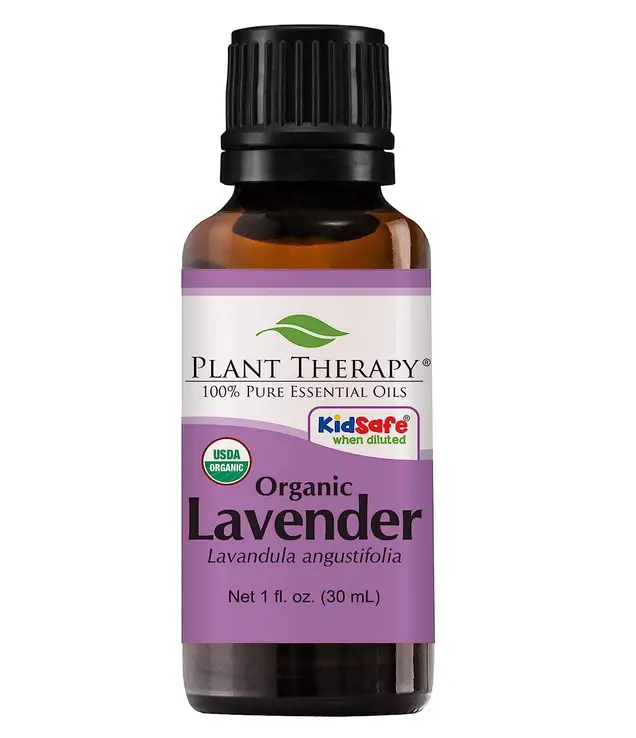
Lavender oil is known for its calming properties, but it’s also beneficial for hair growth. It can help to improve blood circulation, promote hair growth, and prevent hair loss. Mix a few drops of lavender oil with rosemary oil and apply it to your scalp for a soothing and hair-boosting treatment.
2. Peppermint Oil
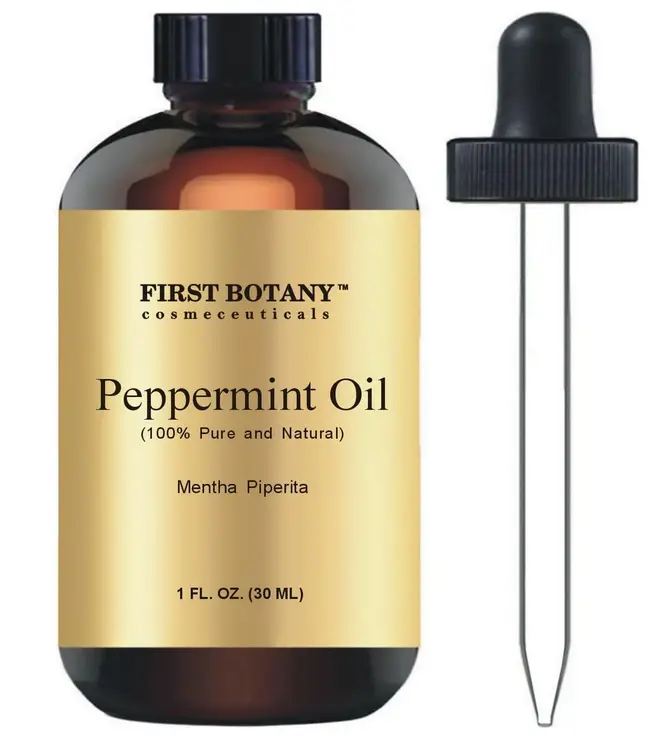
Peppermint oil can stimulate the scalp and help to promote hair growth. It’s also known for its cooling sensation, which can be soothing if you have a dry or itchy scalp. Mix it with rosemary oil for a refreshing hair treatment.
3. Castor Oil
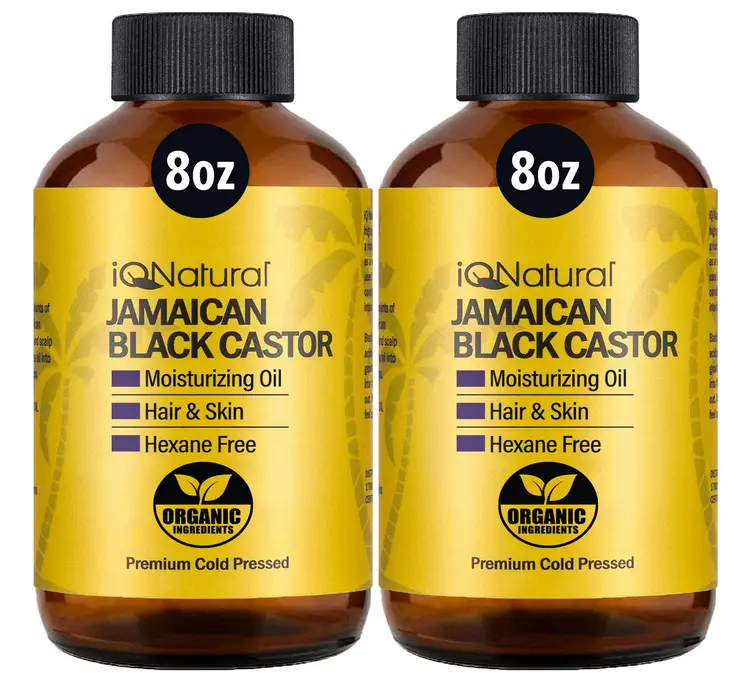
Castor oil is rich in ricinoleic acid, which can help to improve blood circulation in the scalp, promoting hair growth. It’s also a great moisturizer, which can help to keep your hair healthy and shiny. Check out our comparison of Jamaican Black Castor Oil vs Castor Oil for Hair Growth to learn more about the benefits of castor oil.
4. Jojoba Oil

Jojoba oil is similar to the oil (sebum) your body naturally produces. It’s great for moisturizing the scalp and can be used as a carrier oil for other essential oils, including rosemary oil.
Remember, when mixing essential oils, always perform a patch test to ensure you don’t have an allergic reaction. Also, it’s important to dilute essential oils with a carrier oil before applying them to your skin or scalp.
In the next section, we’ll answer some frequently asked questions about using rosemary oil for hair growth. Stay tuned!
Frequently Asked Questions about Rosemary Oil for Hair
In this section, we’ll answer some of the most frequently asked questions about using rosemary oil for hair growth. These answers should provide you with a comprehensive understanding of how to use rosemary oil effectively.
1. How often should I use rosemary oil on my hair?
It’s recommended to use rosemary oil on your hair 2-3 times a week. However, this can vary depending on your hair type and condition. If your hair is very dry, you might want to use it more frequently. Always remember to do a patch test first to ensure you don’t have an allergic reaction.
2. Can I leave rosemary oil in my hair overnight?
Yes, you can leave rosemary oil in your hair overnight for a deep conditioning treatment. Just make sure to wrap your hair in a towel or wear a shower cap to avoid staining your pillow.
3. Can rosemary oil darken hair?
Some people have reported that rosemary oil can darken hair over time, but this isn’t a guaranteed effect. It’s more likely that rosemary oil improves the health and shine of your hair, which can make it appear darker.
4. Can I mix rosemary oil with my shampoo or conditioner?
Absolutely! Adding a few drops of rosemary oil to your shampoo or conditioner is a great way to incorporate it into your hair care routine. This can help to stimulate the scalp and promote hair growth.
5. What other essential oils can be mixed with rosemary oil for hair growth?
Rosemary oil can be mixed with a variety of essential oils for enhanced hair growth. Some of these include lavender oil, peppermint oil, and castor oil. You can learn more about the benefits of these oils in our article on Essential Oils for Hair Growth.
Remember, everyone’s hair is different, so what works for one person might not work for another. It’s all about finding what works best for you and your hair.
In the next section, we’ll wrap up our guide on how to make and use rosemary oil for hair growth. Stay tuned!
Conclusion
In conclusion, rosemary oil is a powerful natural remedy that can help stimulate hair growth, improve scalp health, and enhance the overall appearance of your hair. Whether you choose to make your own rosemary oil at home or purchase it pre-made, the important thing is to use it consistently and correctly for the best results.
Remember, patience is key when it comes to natural hair growth remedies. It might take a few weeks or even months to see noticeable results, but don’t get discouraged. Keep up with your rosemary oil treatments, and over time, you should start to see a difference.
As we’ve discussed, rosemary oil can be used on its own or mixed with other beneficial oils like castor oil, argan oil, and jojoba oil. Experiment with different combinations to find what works best for your hair type and needs.
If you’re interested in learning more about natural hair growth remedies, be sure to check out our other articles on Jamaican Black Castor Oil vs Castor Oil for Hair Growth and Castor Oil vs Rosemary Oil for Hair Growth.
Thank you for reading our guide on how to make and use rosemary oil for hair growth. We hope you found it informative and helpful. Happy hair growing!
Related Articles:
- AI Powered Bald Filter Online 2024: See Yourself with No Hair! - January 19, 2024
- Harklinikken Bad Reviews 2024: Analyzing Negative Feedbacks - January 18, 2024
- How to Get the Alex Eubank Hair | Step-By-Step Tutorial 2024 - January 18, 2024



